
|

|

|

|
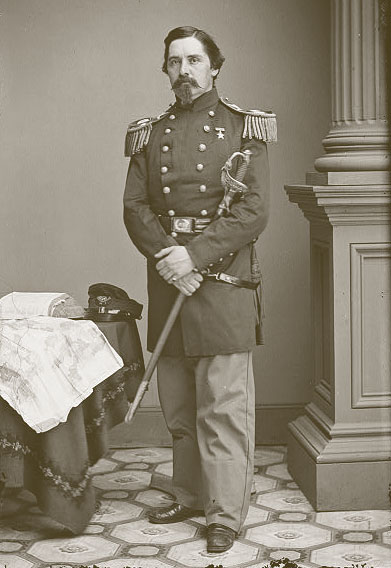
|
Henry Seymour Lansing (17 Feb 1823 - 14 Apr 1882, Burlington NJ) (son Barent Bleecker Lansing and Sarah Breese (brother Henry Livingston Lansing) + (26 Sep 1844, Hartford CT) Jane Amelia White (2 Sep 1825, Onondaga NY - 29 Nov 1904, Trenton NJ)
CHILDREN:
Bleecker Seymour Lansing (14 Jan 1848, Albany NY - 28 Feb 1850, Syracuse NY)
Arthur Lewis Lansing (1 Aug 1852, Paris, Seine, France - 30 Aug 1907, Trenton NJ)
the father of Governor Horatio Seymour 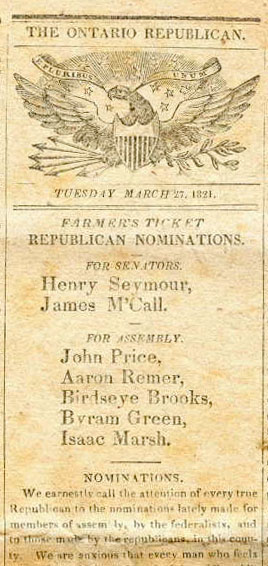 |
| Biography | ||
|
Colonel Henry Seymour Lansing,
Henry Livingston Lansing's brother,
commanded the 17th New York Volunteer Infantry.
The regiment was formed on May 29, 1861 for a two year term and Colonel Lansing
commanded it from its inception until it was disbanded on June 2, 1863. He had also been
active in the formation of New York's Military Association before the war.
Being surrounded by southern sympathizers, there was a great concern for the protection of Washington from the start of hostilities. Colonel Lansing's regiment was first assigned to that duty. From April to May of 1861, Colonel Lansing participated in the Siege of Yorktown, the very place where his grandfather, Colonel Gerrit G. Lansing, had fought in the Revolutionary War.
That summer, they fought in the
Seven Days Battle before Richmond Virginia and by October, the 17th had been transferred to the Army of the Potomac
At the end of the war, Colonel Lansing was promoted by brevet to Brigadier General for his short command of the Bull Run battlefield. | ||
| New York State Families, Page 164 | ||
| General Henry Seymour Lansing died at Burlington, N.J., April 14, 1882. Prior to the breaking out of the war he was the chief manager of the American-European Express Company, and superintended the banking department of the company at Paris for a considerable time. He assisted in organizing the Military Commission of the State of New York before the war. He was appointed Captain of the Twelfth Infantry, and served until July 1863, when he resigned. | ||
| Pioneers of Utica p.349 | ||
| Henry Seymour Lansing, commanded the 17th Regiment, New York volunteers, at the beginning of the late war, and left the service in 1863 with the rank of brevet brigadier-general; is now (1877) auditor general of the Centennial Board of Finance, Philadelphia. | ||
| Philadelphia 1876 Centennial | ||
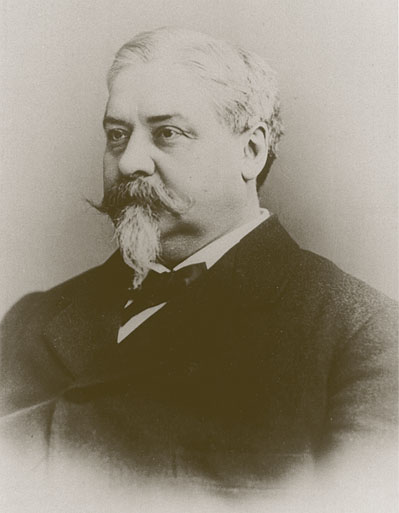
231.19 Bureau of Revenue. Correspondence and Papers 1873-1876
Bureau of Revenue. Correspondence and Papers
Correspondence Received by H.S. Lansing, Auditor | ||
| The Weekly Philadelphia Times - July 13 1878 | ||
| H.S. Lansing, late colonel of the 17th N Y Volunteers, Captain of the 12 US Infantry and Brevet Brigadier General, provides a detailed and emotional account of the demoralization of Union troops following the defeat by Confederate forces at the Battle of Bull Run in 1862. He tells of the discouragement, fear and disorganization that followed that defeat and staes in part how the Union Army ran away in a panic from its first defeat, leaving Washington at the mercy of the Confederates and describes the defenses South of the Potomac River. | ||
| Military Association of New York | ||
| Henry Seymour Lansing, like his brother Henry Livingston Lansing, was active in the formation of The Military Association of New York. | ||
| Civil War Records | ||
|
Civil War On Line Order Of Battle - Second Bull Run Fifth Army Corps Major General Fitz-John Porter First Division Major General George W. Morell Third Brigade Brig. General Daniel Butterfield Colonel Henry S. Lansing
Lansing, H.S. Third, First, Fifth, Potomac.
3d BRIGADE, 1st DIVISION COMMANDERS
H. S. Lansing Col. 17th N.Y. Infy. Aug. 30, 1862, to Sept. 18, 1862
T. B. W. Stockton Col. 16th Mich. Infy Jan., 1863, to May 20, 1863
J. L. Chamberlain Col. 20th Me. Infy Aug. 26, 1863, to Nov. 19, 1863
12th N.Y. Infy May, 1862 From 3-Brig. 1-Div. 3-Corps Pot
YORKTOWN, April 30, 1862
Colonel LANSING:
Garrison--Captain Arnold's light company, one hundred and twenty men, and Seventeenth New York, Colonel Lansing. The supply of ammunition for these forts, although not complete, is sufficient for an emergency, averaging about one hundred rounds per gun, and the amount is being increased as rapidly as possible. The field batteries are in a very unsatisfactory condition, many of them, but as fast as the materials can be procured they are refitting.
| ||
| Cemetery | ||
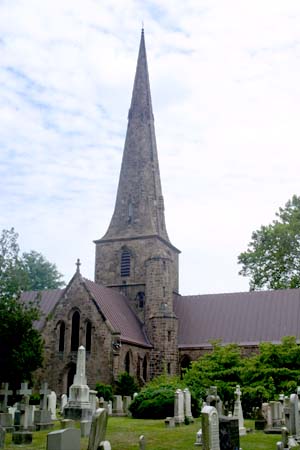
| ||
| Letter of Thanks to Mrs. Van Cortlandt | ||
|
Head Quarters 17th Regiment, Park Barracks, New York, June 1st, 1861
Mrs. C.E. Van Cortlandt, Dear Madam:-- Your esteemed favor of 31st ult., is at hand, and the three cases will have attention, the articles contained distributed as requested, first to the Sing Sing Company, and the surplus to the needy of the Regiment. Permit me, in the name of the Sing Sing company, and on my own account as commandant of the Regiment, to tender to the Ladies, your Association, and yourself, our sincere thanks for your kindness and generosity, and hope, if we have an opportunity, that you will have cause to be proud of the Westchester Regiment. In relation to other articles so kindly offered, I cannot now say, several societies of Ladies are busy with their needles for our benefit, and until we are packed for a start it will be difficult to say what we shall need. It will be something without doubt, and if so will apprize you, as any necessaries can be sent after us.
With respect, | ||
| Newspaper Article Defending Colonel Lansing at Second Bull Run | ||
|
New York Herald June 21, 1863 The Seventeenth New York Regiment To the Editor of the Herald I ask the privilege of your columns to reply to a communication in the morning's Herald, signed "One of the Light Brigade," in regard to the Seventeenth regiment New York volunteers. I was a captain in that regiment, and was wounded in the action of the 30th August, 1862, styled the second battle of Bull Run. Major Grover (since killed at Jonesboro, as colonel of the veteran Seventeenth) commanded the regiment in that fight, led it into action, and was shot down while at the head of it; and the wounds he then received confined him to his room, and most of the time to his bed, for six months. Lieutenant Colonel Bartram was not in command, but acted on Brigadier General Butterfield's staff, being field officer of the day on the 29th, and not relieved on the morning of the 30th, he continued to act as such; and I believe so stated his intention at that time. It is hardly worth while noticing the malicious attack upon Colonel H.S. Lansing, but I, as one of his old officers, cannot permit such injustice to pass unnoticed. Colonel Lansing was ill when the regiment left Harrison's Landing August 15, and was directed by the regimental surgeon to go to hospital at Fortress Monroe, and not attempt the march. He, however, continued in command, in spite of increasing illness on the route to Newport News and from Falmouth to Groveton. The night before the battle of the 30th he was very ill, and on the morning of that day was placed by the surgeon on a cart filled with hay, and moved with the column. On the first shot being fired he called for his horse, and was assisted to the saddle. General Butterfield rode up at this time and told Colonel Lansing that as he had command of the division some one must command his brigade, and asked if he (Colonel Lansing) felt able, to which the Colonel replied he would try and hold out if he could. He then put the brigade into position but, becoming too weak to ride or stand, he was relieved by General Butterfield. The next day he was sent to hospital, and was confined two weeks to his bed with fever. Lieutenant Colonel Bartram, in Colonel Lansing's absence, was attached to General Butterfield's staff for a time, who was then in command of the First division, and afterwards the Fifth corps, and was so acting at the battle of Fredericksburg. Colonel Lansing rejoined the army the latter part of September, and took command of the Third brigade, and as such commander was at the close of October ordered by General McClellan to New York in charge of all volunteer organizations forming in this vicinity. As the cannon captured at Hanover Court House, by reference to Major General McClelland's report it will be seen that he says, "General Emergy had before this been joined by the Twenty-fifth New York (of Martindale's brigade) and Berdan's sharpshooters; these regiments were deployed with a section of Benson's battery, and advanced slowly towards the enemy until reinforced by General Butterfield, with four regiments of his brigade, when the enemy was charged and quickly routed, one of his guns being captured by the Seventeenth New York, under Colonel Lansing, after having been disabled by the fire of Benson's battery." I have thus disposed of the malicious slanders of one who under cover of a desire to correct errors, has been guilty of an attempt to deprive a gallent officer of one of his laurels, and one too, who now sleeps in his bloody grave and cannot refute them; and to insult another who you never found bacward or remiss in duty, and who has always had, and still retains the friendship and respect of his superior officers. Finally, endeavoring to rob a regiment of its honors confirming by a report of the Commander-in-Chief, he has shown himself to be a most unworthy member of the Light Brigade.
John L. Burleigh | ||
| Newspaper Article by Colonel Lansing Defending Regiment | ||
|
THE SEVENTEENTH NEW YORK REGIMENT To the Editor of the Herald Headquarters, Seventeenth Regiment N.Y.V. Camp Sedgwick, Near Alexandria Oct 2, 1861 Your special correspondent from Washington, under date of September 30, in your issue of October 1, does the Seventeenth regiment of New York Volunteers, which I have the honor to command, great injustice by excusing the Fifteenth and Eighteenth New York Volunteers from "acts of vandalism," and having the Seventeenth among the vandals. I received on Saturday night at eleven o'clock orders to march, to support "Arnold's Light Battery;" the regiment left camp with the battery at the appointed time, and never left it until the return to camp. Not a soldier left the ranks or entered a house during the entire day. Please correct the error of "your special correspondent," and oblige yours, etc.
H.S. LANSING | ||
| The Westchester Chasseurs | ||
|
May 2, 1861
During the last few weeks, Colonel H.S. Lansing, the founder, and for some time the President, of the New York State Military Association, and also an ex-member of General Spicer's staff, has been engaged enlisting men to form a regiment, which will be called the Westchester Chasseurs. It has now about eight hundred men enrolled. Five hundred of them are quartered in the large six story building at the corner of Broadway and Rector street; two hundred are at No. 84 Duane and the remainder will be accomodated with temporary quarters in this city as soon as the companies are filled up. Morrisania, Yonkers, Tarrytown, Port Chester and White Plains have furnished one company each; New York city three, and two more are organizing, one in this city and one in Brooklyn. They will be ready to be mustered into the service of the United States at the end of the present week, and will form one of the most effective and serviceable regiments which this State has furnished, as the majority of the recruits come from the farming districts, and all of them are inured to hard work, and all the rough and humble incidents to which they will be subject during a campaign. Their drilling is rigorously carried on at the depots, where they are under the regular garrison regulations of the United States service. Their uniform will be the regulation uniform worn by the New York State Militia. As the principal depot, and also the headquarters of Colonel Lansing, on Broadway, there are five hundred men quartered, the building is about two hundred feet deep by thirty wide, and six stories high. Everything is conducted with military exactness and precision. The companies are drilled by squads during the day, the rooms affording ample space for them. The mattresses upon which the men sleep are all piled up against the wall during the day to afford more room for the marching and drilling of the recruits. And by the time the arms and equipment arrive, Colonel Lansing expects to be able to turn out, not only a fine looking, but well disciplined regiment. | ||
| The Returning Regiments | ||
|
NEW YORK HERALD - MAY 13, 1863 Front Page - Below the Fold THE RETURNING REGIMENTS Arrival and Reception of the Seventeenth Regiment New York State Volunteers -- Dinner at the Park Barracks THEY ARE REVIEWED BY GENERAL M'CELLAN The Seventeenth regiment New York State Volunteers arrived from the seat of war yesterday morning, under command of Lieutenant Colonel Bartram. They numbered about three hundred men, and were fittingly received by the city authorities, as well as the military. This regiment was organized by Colonel H.S. Lansing, and went out from this State over one thousand strong. In its struggles in defense of the national integrity the regiment lost over seven hundred men, and the remaining war-worn veterans yesterday paraded through our principal streets, and were received with enthusiastic welcome at the hands of the people. At four o'clock the procession filed through the Park. The Seventeenth were escorted by the Seventy-first regiment, N.G., the recruiting officers at present in the city, and several private organizations. Major Opdyke, accompanied by the Committee on National Affairs of the Common Council, reviewed the regiment as it marched through the Park. The route of procession was up Broadway to Madison Square, around the square to and through Twenty-ninth street to Fifth avenue, down Fifth avenue to Fourteenth street, down Fourteenth street to Broadway and down Broadway to the Park Barracks. At the Fifth Avenue Hotel Generals McClelland and Fitz John Porter reviewed the regiment as it passed from the piazza of the hotel. The men were halted, and and the most frantic outburst of applause went up from the whole line as their favorite commander was recognized. Cheer upon cheer arose, to which compliment the General modestly bowed his acknowledgements. At the Plaza Barracks the regiment was entertained by an excellent dinner prepared at the expense of the city. Together with the officers of the Seventeenth were present nearly all the recruiting officers at present in the city, among whom were Col. Braulik, of the Defenders, Col. Liebenau, of the Seymour Cavalry, and Col. Mott. Toasts were quaffed to the gallent Seventeenth and the officers, whilst enthusiastic cheers were given for Generals McClellan and Fitz John Porter. Short speeches were made by Col. Lansing, Col. Mott, Capt. Turner, of the Seventy-first andothers. The excellent preparations for the dinner were made under the supervision of Capt. Hicks, of the barracks. The great feature of the entertainment was the great enthusiasm expressed in connection with the name of General McClellan. The following are the officers of the regiment:--
Colonel -- H.S. Lansing | ||
| Death Certificate | ||
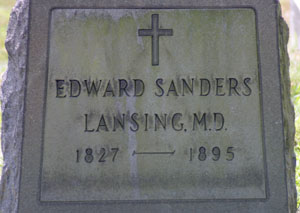 Henry Seymour Lansing
Henry Seymour LansingAge: 58 years 2 months White Married Accountant Birthplace: Utica NY Last place of residence: Burlington How long resident: Six months Place of death: Corner Broad and High Streets; Burlington City Father's name Bleecker B. Lansing U.S. Mother's name Sarah U.S. I hereby certify that I attended H. Seymour Lansing during the last illness and that he died on the 13th day of April, 1882. Length of sickness: two years Edward S. Lansing, Medical Attendant Residence: Corner Stacy and Union Date: April 17, 1882 Undertaker: E.F. Perking Burlington City NJ Burial: St. Mary's Church Grounds Burlington City N.J.
|
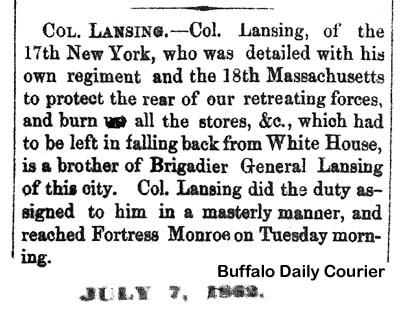
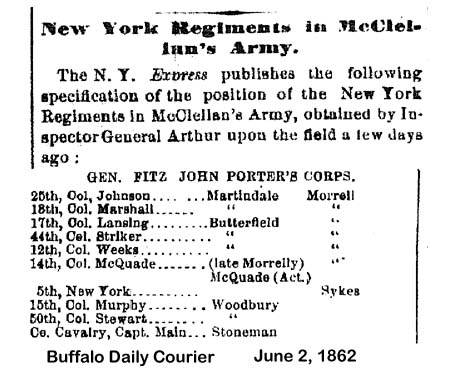
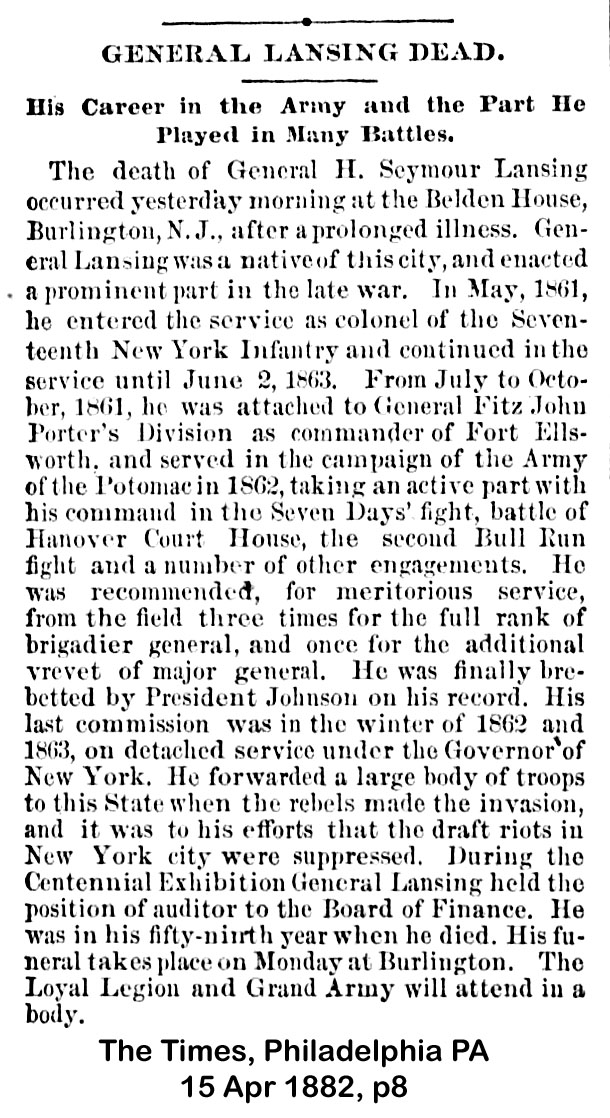
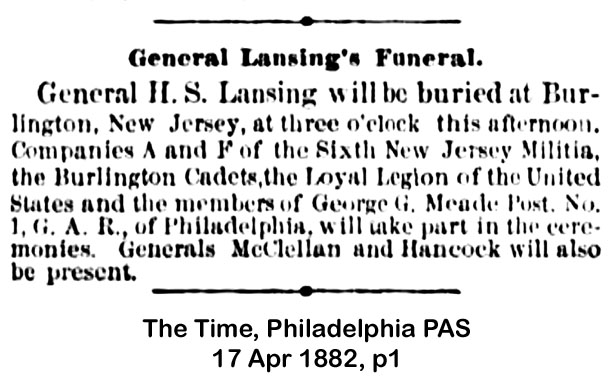
|
NJ Governor Lewis Morris |
 Breese Family |
 Night Before Xmas Henry Livingston |
 President George Bush |
 Father Bradley Van Deusen |
 Mother Jean Van Deusen |
 Home |
 Suggested Favorite Pages |
 Site Map |
 Copyright © 2004, Mary S. Van Deusen
Copyright © 2004, Mary S. Van Deusen
|